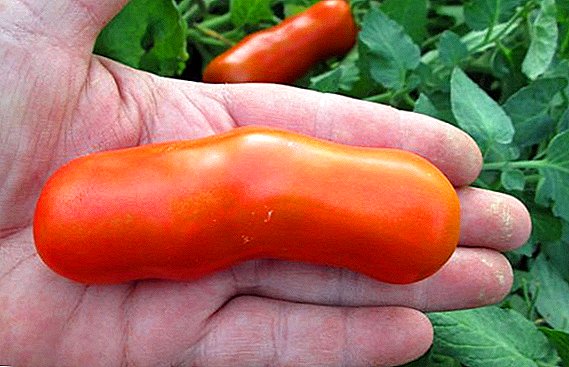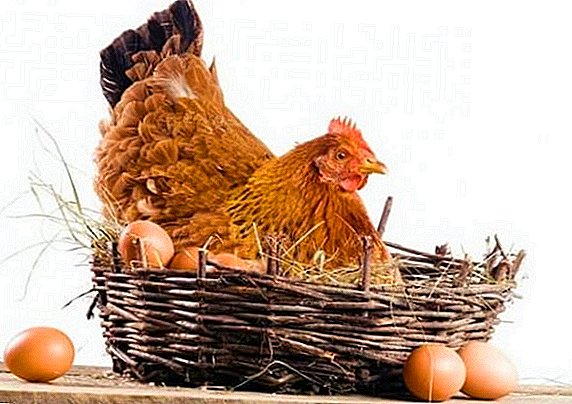 The decision to have chickens in your household is a good way to provide your family with tasty, fresh and natural foods. But many know that chickens can absolutely not rush in the winter. How to preserve egg production throughout the year, what preventive measures to take to save egg productivity even in severe frosts, we will tell further.
The decision to have chickens in your household is a good way to provide your family with tasty, fresh and natural foods. But many know that chickens can absolutely not rush in the winter. How to preserve egg production throughout the year, what preventive measures to take to save egg productivity even in severe frosts, we will tell further.
Main reasons
Chickens can stop sweeping in the winter for several reasons. Most of them are associated with improper maintenance, care and feeding of birds.
The main causes of loss of egg production during the cold season:
- lack of green food in the diet;
- poor diet without added protein and other supplements;
- reduced daylight hours;
- lack of walking;
- freezing of water or the use of snow instead;
- diseases caused by drafts and hypothermia.
Did you know? Chickens are carried only in the light. In order to do this, they are always waiting for the lights to turn on or just for the day to come.
Also it is necessary to take into account factors that do not depend on the conditions of the livestock:
- the age of the chicken (the older the hen, the lower its egg productivity);
- breed of bird (some breeds may have low egg production by nature);
- fear or stress that birds experience for any reason;
- molting period;
- oviductal disease;
- worms and parasites, the presence of which also reduces productivity.

Increased egg production in winter
For layers of the body, as for many other birds, low temperatures are stressful, which causes changes in the functioning of their bodies. To help their birds cope with its negative consequences, you can use a set of simple measures. You need to organize the right balanced diet, maintain a comfortable temperature and do not forget about vitamin supplements.
What to feed in the winter
In winter, laying hens should be more nutritious and nutritious than in summer. Chickens should be fed three times a day.
We advise you to read about what can be given to chickens and what not, whether it is possible to give chickens snow instead of water, and also learn how to feed chickens in winter for egg production.The diet of chickens in winter should consist of:
- ground oats, wheat, peas, corn;
- vegetables (beets, potatoes, carrots, Jerusalem artichokes, pumpkin);
- bran;
- greens (in winter it can be cabbage leaves, parsley, lettuce, wheat germ or dried nettle).
Video: how to feed the chickens in winter so that they carry eggs The best thing you can offer to laying hens in the winter is peculiar porridge made from vegetables or food waste and ground grain. Such porridge can be a little salt.
Important! Eggshell added to the ration of layers will help keep eggs from spraying.
Vitamin supplements
Additional vitamins that will help your chickens to rush well in the winter are contained in:
- probioticswhich increase immunity and positively affect the digestion of poultry;
- dry seaweed. They help strengthen the eggshell and saturate the yolk;
- apple vinegar. It can be added to drinking water to enhance the general condition of the chicken;
- fish oil. Due to its high content of vitamins and fatty acids, it significantly increases egg productivity.

Conditions of detention
To preserve the egg production of chickens in the winter, you should pay attention to the conditions of their detention:
- Humidity in the chicken coop should be no more than 60-70%. Dampness can cause infections, and dry air can cause drying of mucous membranes and egg cracking. Both that and another negatively influences egg productivity. To keep it, be sure to equip the chicken coop with ventilation;
- watch the lighting. In winter, increase the daylight hours for the hens to the required 15-16 hours per day by equipping with special lighting;
- provide chickens walking. If the air temperature is not lower than -10 ° C, chickens may well walk outside. At the same time, the area should be well lit and protected from the wind. Also for the hens it is important to be able to go out independently and enter the house. To do this, equip a small manhole;
- In winter, change the water regularly and add fresh food to the feeders.
Did you know? Chicken can easily lay eggs without a rooster. She does not need it for this.
Temperature in the hen house
In the room where the hens are kept, the temperature should not be below + 12 ... +18 ° C. Reduced or unstable temperature can cause a sharp decrease in the egg productivity of the population. 
Preventive actions
Before the onset of winter cold, a number of preventive measures should be taken to help preserve the productivity of the hens in the winter period.
Food and water
In the summer it is worth taking up the procurement of a sufficient amount of grain feed - barley, oats, wheat. Also in the warm season you need to take care of the preparation of green fodder and impose nettle brooms. In the warm season, you can buy sunflower cake, which is a good protein supplement, concentrated feed, fish and meat and bone meal.
In winter, it is important to monitor the water temperature in the drinking bowls and to prevent its freezing. Its temperature should be within + 10 ... +14 degrees. Today, special designs are sold for heating water in drinking bowls with an incandescent lamp, you can also make it yourself.
Important! Feeders, filled with a mixture of crushed shell and chalk or gravel, will help fill the lack of calcium in the chicken. Be sure to place them in the hen house.
Lighting
Place infrared lamps in the chicken coop that will illuminate the feeding and drinking areas well. Change the light intensity with a dimmer (electronic dimmer) or turn on two lamps in turn with different intensities. 
Walking
While it is warm outside, take care of winter walking, which should be covered with a canopy and fenced from the weather. Put the litter on the floor so that the legs of your hens are not cold in winter. The deeper the litter, the lower the temperature you can walk chickens. Also on the paddle place the boxes with sand and ash, in which the hens will bathe, getting rid of the parasites living in their feathers.
Warming the chicken coop
This is probably one of the most important preventive measures. Indeed, in a cold henhouse, hens can not only not be carried, but even not survive. Before the onset of frost, it is necessary to close all the cracks in the room, check the ceiling for holes, see how tightly the doors close. Be sure to warm the walls.
Read more about how to prepare a chicken coop for the winter with your own hands.
With decreasing temperature, install a heater in the room. The most safe for chickens - infrared. Its principle of operation is that it heats objects, not air. This allows you to keep warm in the hen house for a long time. Protect the scallops of birds from frostbite by brushing them with petroleum jelly or goose fat.
Video: warming the chicken coop To preserve the egg productivity of chickens in winter is not an easy task. The main thing - with the onset of cold weather, to provide the livestock with the most comfortable conditions of existence and carefully approach the organization of feeding birds. The results will not keep you waiting, and your hens will be able to please you with fresh eggs in the same quantity as in summer.












